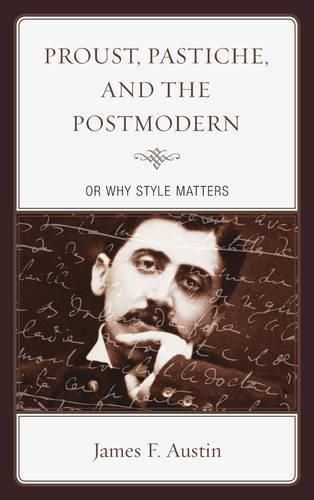Readings Newsletter
Become a Readings Member to make your shopping experience even easier.
Sign in or sign up for free!
You’re not far away from qualifying for FREE standard shipping within Australia
You’ve qualified for FREE standard shipping within Australia
The cart is loading…






Proust, Pastiche, and the Postmodern, or Why Style Matters argues against the traditional view that Marcel Proust wrote pastiches, that is, texts that imitate the style of another author, to master his literary predecessors while sharpening his writerly quill. On the contrary, James F. Austin demonstrates that Proust’s oeuvre, and In Search of Lost Time in particular, deploy pastiche to other ends: Proust’s pastiches, in fact, do things with words to create powerful real-world effects. His works are indeed performative acts that forge social relationships, redefine our ideas of literature, and even work against oppressive political and economic discourses.
Building on the speech-act theory of J.L. Austin, Jacques Derrida, and J. Hillis Miller, and on the postmodern theory of Fredric Jameson, this book not only elucidates the performative nature of pastiche, but also shows that the famous Goncourt pastiche from In Search of Lost Time has attracted so much attention because it already attained the postmodern; that is, it eliminated temporal depth and experience, transforming time itself into a nostalgic style of an era, and into the sort of aestheticized surface that came to define postmodernism decades later.
To reflect this transformation of pastiche, this work rearticulates its history in France around Proust. Reconfiguring a scholastic, classically-inspired pedagogical tradition based on imitation, and breaking with the dominant satirical practice, Proust’s work opened up possibilities in the twentieth century for a new kind of pastiche: playful and performative in the literary field, and postmodern in a French cinema that, as with the Goncourt pastiche, represents time as the visual style of an era, whether unreflexively in heritage films such as Regis Wargnier’s Indochine, or discerningly in Eric Rohmer’s Lady and the Duke, which uses period pictorial and painterly conventions to illustrate how the representation of history onscreen typically flattens time into style.
$9.00 standard shipping within Australia
FREE standard shipping within Australia for orders over $100.00
Express & International shipping calculated at checkout
Proust, Pastiche, and the Postmodern, or Why Style Matters argues against the traditional view that Marcel Proust wrote pastiches, that is, texts that imitate the style of another author, to master his literary predecessors while sharpening his writerly quill. On the contrary, James F. Austin demonstrates that Proust’s oeuvre, and In Search of Lost Time in particular, deploy pastiche to other ends: Proust’s pastiches, in fact, do things with words to create powerful real-world effects. His works are indeed performative acts that forge social relationships, redefine our ideas of literature, and even work against oppressive political and economic discourses.
Building on the speech-act theory of J.L. Austin, Jacques Derrida, and J. Hillis Miller, and on the postmodern theory of Fredric Jameson, this book not only elucidates the performative nature of pastiche, but also shows that the famous Goncourt pastiche from In Search of Lost Time has attracted so much attention because it already attained the postmodern; that is, it eliminated temporal depth and experience, transforming time itself into a nostalgic style of an era, and into the sort of aestheticized surface that came to define postmodernism decades later.
To reflect this transformation of pastiche, this work rearticulates its history in France around Proust. Reconfiguring a scholastic, classically-inspired pedagogical tradition based on imitation, and breaking with the dominant satirical practice, Proust’s work opened up possibilities in the twentieth century for a new kind of pastiche: playful and performative in the literary field, and postmodern in a French cinema that, as with the Goncourt pastiche, represents time as the visual style of an era, whether unreflexively in heritage films such as Regis Wargnier’s Indochine, or discerningly in Eric Rohmer’s Lady and the Duke, which uses period pictorial and painterly conventions to illustrate how the representation of history onscreen typically flattens time into style.